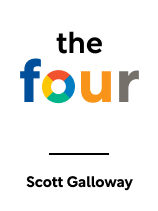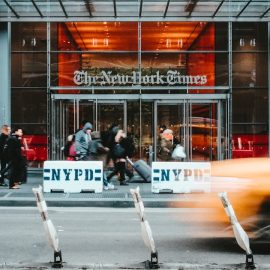

This article is an excerpt from the Shortform book guide to "The Four" by Scott Galloway. Shortform has the world's best summaries and analyses of books you should be reading.
Like this article? Sign up for a free trial here.
What was the Cambridge Analytica scandal? Did Russia really place divisive ads on Facebook?
According to Scott Galloway, Facebook is perhaps the worst Big Tech offender when it comes to prioritizing profit over privacy and democracy. He discusses Facebook’s scandals affecting the 2016 election, its polarizing ad model, and its refusal to take responsibility for fake news on its platform.
Keep reading to learn about the troubling history of Facebook and politics.
Election Scandals
Galloway discusses two scandals involving Facebook and politics, specifically the platform’s actions that affected the 2016 election.
Galloway explains that Facebook has engaged in repeated violations of its users’ privacy. It shared data with third-party apps without users’ knowledge, despite being warned against this practice by the Federal Trade Commission (FTC) in 2011, and despite promising the FTC that it would stop. In the run-up to the 2016 election, it exposed the personal data of millions of Americans to Cambridge Analytica (the Trump campaign’s political consulting firm), which harvested the information without users’ knowledge. Cambridge Analytica then used the data to create behavioral profiles capable of targeting pro-Trump messages to specific voters.
In addition, Galloway notes, after initially denying that it had anything to do with foreign interference in the 2016 election, Facebook later admitted to taking money from Russia to place divisive ads that were seen by hundreds of millions of users. Galloway says that, if any other media company had taken money from a foreign actor for ads inciting racial and political division, it would have been penalized, fined, or seen major advertisers pull out. Galloway claims that Facebook is able to get away with this behavior because of its size and power.
| Legal Consequences for Facebook’s Privacy Violations While Facebook was never fined for selling ads to Russia, in 2019, after The Four was published, the FTC did fine Facebook $5 billion after determining that the company’s sale of data to Cambridge Analytica violated a 2012 FTC privacy order. The Cambridge Analytica scandal has also resulted in several lawsuits against Facebook. For example, a 2021 shareholder action alleges that Facebook paid the FTC billions extra to avoid having CEO Mark Zuckerberg and COO Sheryl Sandberg deposed, and to avoid a personal lawsuit against Zuckerberg. In addition, a 2022 suit by the Attorney General of Washington, D.C. claims that Zuckerberg was personally involved in the decision to sell data to Cambridge Analytica. |
Polarization and Fake News
Facebook’s ad model itself leads to increased political polarization, says Galloway. It’s easy for Facebook to identify people on the extreme ends of the political spectrum based on likes and other online activity, but it’s harder to identify moderates. So Facebook focuses its targeted ads on far-left liberals and far-right conservatives and doesn’t bother with the people in the middle. This results in increased polarization because the ads further entrench people’s partisan loyalties.
(Shortform note: Although Facebook has repeatedly denied claims that its platform stokes divisiveness, many studies have concluded that Facebook contributes to political animosity in the US. These studies have determined that while Facebook is not the primary cause of political polarization, it does significantly exacerbate the problem.)
This, in turn, creates a strong incentive for Facebook to allow fake news that appeals to people’s partisan loyalties to appear on its platform—because the company profits from the clicks and revenue fake news generates. According to Galloway, Facebook’s failure to take any responsibility for the truth of its content allows lies and disinformation to spread rapidly among Facebook’s billions of users, influencing political views and ultimately posing a threat to democracy.

———End of Preview———
Like what you just read? Read the rest of the world's best book summary and analysis of Scott Galloway's "The Four" at Shortform.
Here's what you'll find in our full The Four summary:
- A hard look at the success of Amazon, Apple, Facebook, and Google
- How The Four have had a profound and negative impact on our society
- How to make it in the cutthroat economy created by The Four






